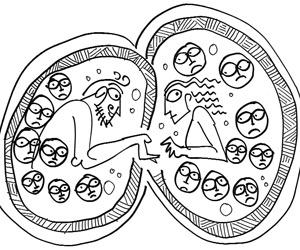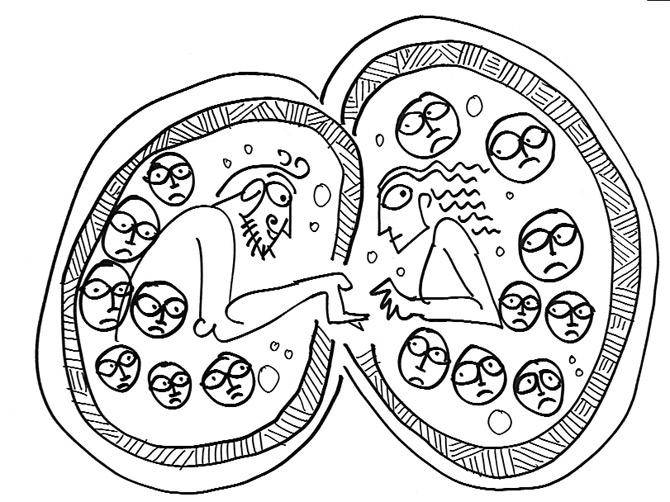A young girl from Mizoram was told by her father to return home immediately after he learned that she was in love with a boy in Delhi


Illustration/Devdutt Pattanaik
ADVERTISEMENT
 A young girl from Mizoram was told by her father to return home immediately after he learned that she was in love with a boy in Delhi. My friend said, "But isn't your boyfriend also from Mizoram?" The girl nodded yes. "But isn't the boy also Christian?" The girl nodded yes. "Then what is the problem?" my friend asked. The girl said her father disapproved as the boy did not belong to her tribe!
A young girl from Mizoram was told by her father to return home immediately after he learned that she was in love with a boy in Delhi. My friend said, "But isn't your boyfriend also from Mizoram?" The girl nodded yes. "But isn't the boy also Christian?" The girl nodded yes. "Then what is the problem?" my friend asked. The girl said her father disapproved as the boy did not belong to her tribe!
While people decry the lower rate of inter-caste marriages in India, they don't decry the low rates of inter-tribe marriages in India. The former is seen as indicator of casteism but the latter is not seen as indicator of tribalism. The former is bad and must be annihilated. But the latter is not seen as bad; in fact, securing tribal culture is actively encouraged. Basically, we are conditioned to see casteism as bad, but tribalism as good, though both are different kinds of group dynamics.
Why is casteism not okay but tribalism okay? Is this question a case of whataboutery raised by a 'savarna' who does not want to annihilate caste? Or is this a question that seeks to understand which form of groupism is allowed by contemporary society and which form of groupism is not?
Abrahamic religions are based on tribalism. The God of Abraham demands complete allegiance and only those who follow him become the Chosen people with entitlement over the Promised Land. Modern nation state is based on the notion of tribalism. By submitting completely to the constitution, which serves as God's commandment, we declare our allegiance to the nation-state. Marriage to a non-citizen demands approval of the state. Complex visa rules will demand eventually that one of the two spouses give up his allegiance to one tribe/nation, by giving up citizenship to one nation and accepting the citizenship of another nation. Dual citizenship is seen only amongst very affluent tribes also known as developed countries.
Around the world, arguments are becoming increasingly polemical, divisive and even absurd. A characteristic feature of this trend is the increasing tendency to exclude and isolate the other. So, the right wing mocks the left wing, does not invite them to the table to share food and thoughts. The left wing reciprocates in the same way. In self-righteous indignation, the door is shut firmly to keep out those who disagree and refuse to align entirely. Noble reasons are given to justify the exclusion: demand for justice, honour, maturity, and respect. This is neo-tribalism at work. It is natural that this emerges from the West, which for centuries has been dominated by Abrahamic faiths, where priests who do not align are 'defrocked' and members who do not align are 'excommunicated'.
Casteism is not about exclusion or excommunication. But it is about hierarchy and inequality. No one is kicked out of the village; but some people have more resources, respect, access and agency than others. Inter-caste marriage is not allowed to maintain purity of the caste; just as inter-tribal marriage is not allowed to maintain purity of the tribe.
But, in casteism, the other, though disrespected, is included. In tribalism, the other is disrespected as well as excluded. In an ideal world, we want to be included and respected and treated as equals — allowed to marry anyone we want and cling to any view and choose any lifestyle. This can only happen when we outgrow the need to control the other. But that is a very difficult thing.
The author writes and lectures on the relevance of mythology in modern times. Reach him at devdutt@devdutt.com
Catch up on all the latest Mumbai, National and International news here
Download the new mid-day Android and iOS apps to get updates on all the latest and trending stories on the go
 Subscribe today by clicking the link and stay updated with the latest news!" Click here!
Subscribe today by clicking the link and stay updated with the latest news!" Click here!






